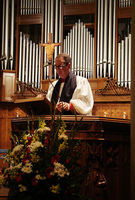According to data from the National Congregations Study (2006-2007), 38% of people in the United States associate themselves with liturgical churches (Roman Catholic, Lutheran, Episcopal, etc.); while 46% associate themselves with free churches (Baptist, Pentecostal, non-denominational, etc.). The 14% of people associated with Methodist and Reformed/Presbyterian churches sit atop this watershed—some sliding down the liturgical slope, others down the free church slope. Liturgical churches emphasize historical and global continuity in their worship services; whereas the term “free church” is related to the relative autonomy of individual congregations. Almost every heated discussion about the church tends to divide along these liturgical / free church lines.
Liturgical clergy see their role as being a faithful steward of historic Christianity. This consists especially of serving the Lord’s Supper and preaching. Free church pastors tend to see their role as equipping their congregations for evangelism and social justice. Because of their different understandings of their roles, it is not surprising that free church pastors are open to insights gleaned from megachurches, church planters, and business leaders; while liturgical church clergy see these sources as consumeristic, arrogant, and hopelessly misguided.
Nowhere is free church innovation more plainly seen than at The Catalyst Conference attended by 13,000 people October 8-9 outside Atlanta, Georgia. The Catalyst Conference is “specifically focused on leaders under the age of 40.” Its podcast tagline is “what’s next in the church.”
At Catalyst, the “free” in free churches was big and bold. The speakers were free from using notes when they spoke. The worship leaders were free to play songs they had written. Five of the seven pastors had planted a church: Andy Stanley, Rob Bell, Francis Chan, Chuck Swindoll, and Louie Giglio. Similarly, Jessica Jackley, Priscilla Shirer, and Dave Ramsey founded their organizations. Malcolm Gladwell is a best-selling author. What they had in common was the ability to communicate. The churches and organizations they lead had partially developed out of their effectiveness in communication.
The strength of the Catalyst Conference is also the strength of the Free Church tradition—the willingness to experiment with ways of reaching people—the unchurched and the poor—with the goodness of the gospel. Paul writes, “I have become all things to all people so that by all possible means I might save some” (1 Cor 9:23). Scratch the surface of a Christian who is an “innovator” or “leader” and you have underneath a person with a passion to reach people with the good news.

High Church (An Anglican priest presides over the liturgy)
What liturgical church clergy can learn from the Catalyst Conference is to impress on their people that they are missionaries for Christ—”communicators”—the biblical word is “witnesses.” Of course, they need not learn it from Catalyst. The Roman Catholic Vatican II’s Lumen Gentium (1964) says, “Since, like Paul the Apostle, the bishop is debtor to all men, let him be ready to preach the Gospel to all, and to urge his faithful to apostolic and missionary activity.”

Hijinks (Catalyst emcee Lanny Donoho entertains the crowd)
The weakness of Catalyst is also the weakness of the Free Church tradition. Authenticity, vulnerability, spontaneity, and extemporaneous communication characterized the Catalyst speakers. Almost all of the speakers walked around and used few if any notes when they spoke. Some were able to pull this off with obvious preparation and memorization. Others resorted to off-the-cuff stream-of-consciousness rambling. The former was powerful. The latter produced cringes by people in the audience for the socially inappropriate and theologically problematic comments that slipped out.
This is symptomatic of the free church tradition. Some contemporary worship songs, church plants, and megachurches are spectacularly effective. Others spectacularly self-destruct. Untethered to a hierarchy or narrow role of guarding the tradition, there is extreme pressure on the leader. At the Catalyst Conference, speaker after speaker with massive churches and best-selling books talked about the toll their “success” had taken on their family and themselves. They emphasized the need for systems of support and accountability. A frequent comment from the stage was “Remember that it is all about Jesus.” What is fascinating is that these admonitions are central for liturgical church clergy. Because it is good to have colleagues and not to have the responsibility to make it all up as one goes along, liturgical clergy participate in a larger denominational structure. Because there is peace and health that comes from rooting the pastoral task in the finished work of Christ, they celebrate the Lord’s Supper weekly. Catalyst leaders need not be “free” (that is, “lost”) from the insights of the rich liturgical church tradition on pastoral spiritual, physical and social health. The Catalyst Conference can catalyze liturgical church clergy and free church leaders to learn from each other rather than dismiss each other.










